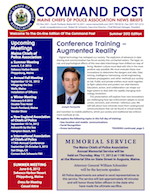
Psychological Examiner
Licensed Clinical Professional Counselor
Limited Liability Company
home

| Annual Resiliency Review |
The advantages of implementing an Annual Resiliency Review program are many. First, the cost to a department is minimal while the advantages are many and may be lifesaving. Law enforcement administrators have a responsibility to not only serve and protect their community but to the health and well-being of the men and women who work for them and an Annual Resiliency Review for each police officer is perhaps the only way to help ensure each police officer has continued good health. Police administration in the 21st century is a daunting task regardless of the size of the department and the Annual Resiliency Review can help alleviate some the stress associated with personnel management. The Annual Resiliency Review dovetails into any existing employee wellness program or can be an effective stand-alone program uniquely tailored to individual departmental needs. Benefits of Implementing an Annual Resiliency Review
What is and Annual Resiliency Review? The purpose of an Annual Resiliency Review is two-fold. The first reason is to have a culturally competent mental health professional assess the officer’s emotional and psychological readiness for the coming year. That is, is the officer coping with the stressors of life and the job in a healthy and adaptive way? Conversely has the officer’s capacity to cope with stress and adversity been overwhelmed by critical incidences, cumulative workplace stress, family stress, relationship problems, health problems, or some combination of them all to the point where maladaptive coping behaviors (e.g., copious alcohol consumption, sleep medication, working excessive hours, infidelity, etc.) have taken over. While the officer may not recognize the trouble s/he is in a culturally competent mental health professional will see the risk factors for the dangers they portend and advise the officer on how to fortify him/herself going forward. Oftentimes, having a professional acknowledge the weighty, painful experiences is all that is needed to get someone to buy into the need for and to accept some guidance and help. Participating officers will leave the review with information on how to strengthen their resilience against workplace stress, and thereby fortify themselves further for the coming year. What an Annual Resiliency Review is Not The Annual Resiliency Review is not a fitness-for-duty evaluation (FFDE). A FFDE evaluation is a comprehensive psychological evaluation that often includes psychological testing, a detailed review of the officer’s personal and professional history, and collateral interviews, requiring many hours of assessment and culminating in a detailed and lengthy report outlining an officer’s limitations and liabilities. The FFDE report includes recommendations for treatment and follow-up procedures. It is a formal, specialized examination that results from (1) objective, observable evidence that an officer may be unable to safely or effectively perform their duties, and (2) a reasonable basis for believing that the cause may be attributable to a psychological condition or impairment (IACP, 2009). The Annual Resiliency Review is not a substitute for a disciplinary action. It is not a “stick” to be used to coerce officers or to shame them. Any use of the Annual Resiliency Review for purposes other than to promote workplace health and adaptive coping strategies would be a misuse of the program. The Annual Resiliency Review is not a fishing expedition. Administrators cannot use it as a pretense for searching for suspected causes of disciplinary problems. If there is objective evidence that an officer’s performance is substantially substandard, and a psychological malady suspected as being the cause then a FFDE should be considered.
|
 Read more about Annual Resiliency Reviews in the Summer (2012) issue of Command Post.
Read more about Annual Resiliency Reviews in the Summer (2012) issue of Command Post.